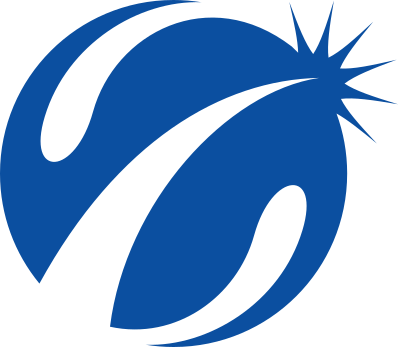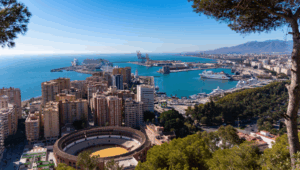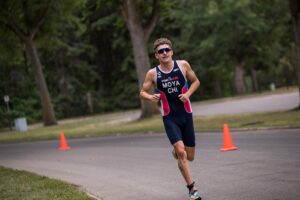Up close with Ultraman Rob Gray
Rob Gray won the 2016 Ultraman Florida this past weekend by 8 minutes and he had a chat with us about these 3 long days of fun in the February sun. When we saw him in Kona last October we snapped an image gallery of his distinctive Dimond race bike, but now the focus is all on him.
Slowtwitch: Thanks for your time.
Rob Gray: Thanks Herbert, it’s always great to chat with you,
ST: Has the Ultraman win sunk in already?
Rob: It certainly has. I was leading on day 1 and day 2, and then had to fight like crazy to keep it on day 3. So I had over 30 miles of deep pain where I was fighting for the win, and getting to that finish line was very real!
ST: When did that idea to tackle this event come up? Was it before Kona or after?
Rob: I turn 40 this year, and I wanted to do something epic like race Ultraman Hawaii. However to get into Hawaii you need to do another Ultraman race, which I why I entered Florida last April.

ST: I think you were not too happy with your Kona day.
Rob: I had a good swim and bike and then just melted on the run. It was about 10 degrees F hotter than previous Kona events and it was too much for me.
ST: I think you said on your blog that hot races like Kona are just not for you.
Rob: I don’t mind the heat, as long as I’m lean. In 2015 I arrived in Kona having been on the “Jan Ullrich” plan (remember how he used to stack on the pounds over winter and then be out of shape to race Lance?). So the extra insulation didn’t affect my swim or bike negatively but I felt like I was going to die on the run.
ST: So where were you weight wise and how does it compare to when you are not Jan Ullrich like?
Rob: At Kona 2015 I was 78kg, and in 2013 I was 73kg. 71kg-73kg is what I need to be in order to be comfortable in that heat.
ST: And for perspective, how tall are you?
Rob: I’m 184cm (6’1”)
ST: So no Kona in 2016?
Rob: I turned down my 2016 KQ slot at Arizona. I feel that when I next race Kona, I only want to take part if I can be competitive and do the race justice. Just being there to “soak it up” is no longer motivating to me. Since I want to put all of my energy into preparing for Ultraman Hawaii, I didn’t think I could do both well in the same year.

ST: Would Norseman be more appropriate temperature wise?
Rob: Norseman looks like such an epic race. I’m not sure extreme cold would be that much fun either though!
ST: What is the exact requirement to start the Ultraman in Hawaii?
Rob: You need to submit a race resume when you apply. At this point in time, you need to have completed another Ultraman event if you want to get in. There is no time or placing requirement in order to qualify, you just need to finish.
ST: I think you raced Ironman Arizona in November as training for the Ultraman event.
Rob: Yes Arizona was a good event to force some big training just before winter, and to test out some pacing ideas for the Ultraman bike.
ST: And you made someone happy who got your Kona slot.
Rob: It felt so great to see that guy’s face when he got the roll down. His whole family was high fiving me.
ST: Leading up to Ultraman what were the longest workouts you had done?
Rob: I did a 7k swim last Friday, and a 6-hour bike ride last Wednesday. The longest run was consecutive long runs of 19 and 28 mile runs (on a Friday and Saturday)
ST: What pacing did you have in mind?
Rob: For the swim I planned to go by feel – start easy and then when I had 4k to go, swim as if it was an Ironman. For the bike I planned to ride at a half Ironman effort (no need to run afterwards) and for the run I planned on running an 8 hour double marathon. Based on my training times, I felt running around 8:45 pace with regular walking added in was what I could sustain for a long time.
ST: When did you arrive in Florida?
Rob: On Wednesday, a few hours before the registration cut off time.

ST: In terms of weight, where were you?
Rob: I came down with a severe flu last Friday, and was in bed unable to move that whole weekend. The silver lining is that I went from 79kg on Friday to under 76kg on Tuesday!
ST: Were you concerned about any specific competitors or did you not really know who they were?
Rob: I knew nobody, which I’m not used to. For most Ironman races I do, I know all the main contenders as well as their relative strengths and weaknesses. I knew nothing about anyone.
ST: I think day 1 worked out well.
Rob: Yes, I had an amazing swim. I changed wetsuits after IMAZ where I had a terrible swim. I bought a Roka Maverick Pro, which enables a lot of movement in my torso and helped me to feel very natural. I was first out of the water by about 4 minutes and then onto my favorite discipline, the bike. I took a wrong turn in the first 4 miles, but I blame swim-brain for that. The bike on day 1 was only 90 miles, I paced the effort super easily, but it was very windy so it was very taxing on the body even though I was purposefully outputting low power.
ST: What is low power for you?
Rob: I averaged 185 watts on day 1. For the first half I was under 180.
ST: Did you eat anything during the swim?
Rob: I had 2 bike bottles with my kayak guide, with about 400 calories each, and a bottle of water. I had a few sips of water after 1 hour, and then 1 bottle of calories at 2 hours. That’s it. You lose a lot of time if you stop to eat regularly, so I decided to make one major stop at 2 hours and that’s it.
ST: Day 2 was all about the bike and you served notice.
Rob: I started hard right from the go. I felt really amazing, the lighter effort on day 1 paid off. However 2.5 hours in, my aero pad snapped off. Chris and Ethan from Dimond had a spare bike for me, so we tried to swap out the pad but somehow the holes were a little stripped, so we ended up swapping bikes, and they swapped out all my wheels, bottles etc. too. They did the whole change in just over 5 minutes, and then I was up and running on the spare bike for the rest of the day.

ST: Where does your bike split rank in terms of the course record?
Rob: 8:06 was the second fastest bike split, 5 minutes slower than the record of 8:01
ST: Oh, that darn mechanical.
Rob: It’s easy to think about it like that, but I got some nice rest and extra fuel during those 5 minutes, which may have helped me later on. The last 3 miles of that 171-mile bike was a very dark place for me, and I thought I was going to just fall off my bike and crash at any second. So maybe stopping for a few minutes helped me a bit overall.
ST: Your lead was around an hour after the bike segment. Were you happy?
Rob: Yes, I knew I would need a buffer for the run. About 20 miles from the end of day 2, I only had an 11-minute lead on 2nd place David, so I dug as deep as I could and managed to put in another 9 minutes before the end. So I was very happy with the 56-minute lead going into day 3.
ST: Did you sleep ok during those nights and especially that night before day 3?
Rob: Yes, it’s amazing how well I can sleep when my kids are not there!
ST: So no nervousness?
Rob: No, it was very different to racing an Ironman. I think part of it is that I had a very high level of confidence in my crew, so I didn’t have to worry about prepping my bike or getting anything ready. Ethan and Chris from Dimond would do a full work over on my bike each night, and Kevin Coady would be making sure I was doing all the right things (eating, drinking, sitting in the hot tub).
ST: What pace did you run and did match what you had planned?
Rob: I averaged just over 9:00/mile. It was pretty much perfect pacing. I had planned on running 8 hours for the double marathon, but when I went through the marathon mark in 3:58, David had gone through 27 minutes earlier. At that point I knew that I could not afford to slow down, plus I had to speed up a little to be secure. It was extremely challenging to maintain that pace on the 2nd marathon.
ST: In the end I think you won by 6 minutes. Was it even closer at some point?
Rob: I won by 8 minutes. Based on the half way time gap, we would have been 30-90 seconds apart at the end, assuming that neither of us slowed down.

ST: So how will you celebrate?
Rob: My crew and I just went out for a nice seafood meal to celebrate. Unfortunately I don’t feel like eating or drinking anything. I really tried hard to drink a beer earlier but I got in about 2 sips before I could take no more.
ST: And what is next?
Rob: Boulder 70.3, Boulder Ironman, then the big one Ultraman Hawaii in November. I’m looking forward to not having to train over winter for that one! I did enter the Leadville 100 run but right now I’m pretty happy that I didn’t get in.
ST: Is there anything else we should know?
Rob: Two things. Firstly, this race was very well organized, kudos to Sway, Jen and the whole team. Steve King is an amazing race announcer! He is such a professional and is basically an encyclopedia of triathlon. The post-race meal was phenomenal! It was all homemade food that was just delicious. I never eat much after an Ironman race, but I went back for seconds and thirds here.
Secondly, one of my key lessons out of this race is that the right crew is absolutely critical. Ethan and Chris were 100% on top of my bike stuff all the time, and Kevin knows me so well as an athlete, that on the run he could tell me exactly what I needed to hear at the exactly the right time, to keep me in the game. They also take care of everything else before and after each day, so all I needed to do was race. They really made a difference. Another interesting fact is that my swim escort, Brian Gruber, is a local guy who volunteers every year. His swimmer has been first out the water every year… so I was relieved that I didn’t compromise his perfect record!






